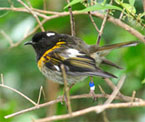The Promiscuous Hihi
A team of researchers has found that reintroductions of a small New Zealand bird, called the hihi (Notiomystis cincta), onto the tiny islands around the North Island and into reserves on the mainland have been more successful than they expected — at least, genetically speaking. They think this is partly because the birds have thrived, their starting populations were larger, and because the male hihi is rather promiscuous. This means hihi genes from more males are inherited by the next generation, so hihi populations end up retaining what scientists call genetic diversity. “In comparison to other New Zealand species which have gone though reintroduction, the hihi has a high level of genetic diversity, partly because it’s promiscuous, which is unusual: most other New Zealand birds are monogamous,” says Dr Patricia Brekke from the Zoological Society of London, who led the research.














